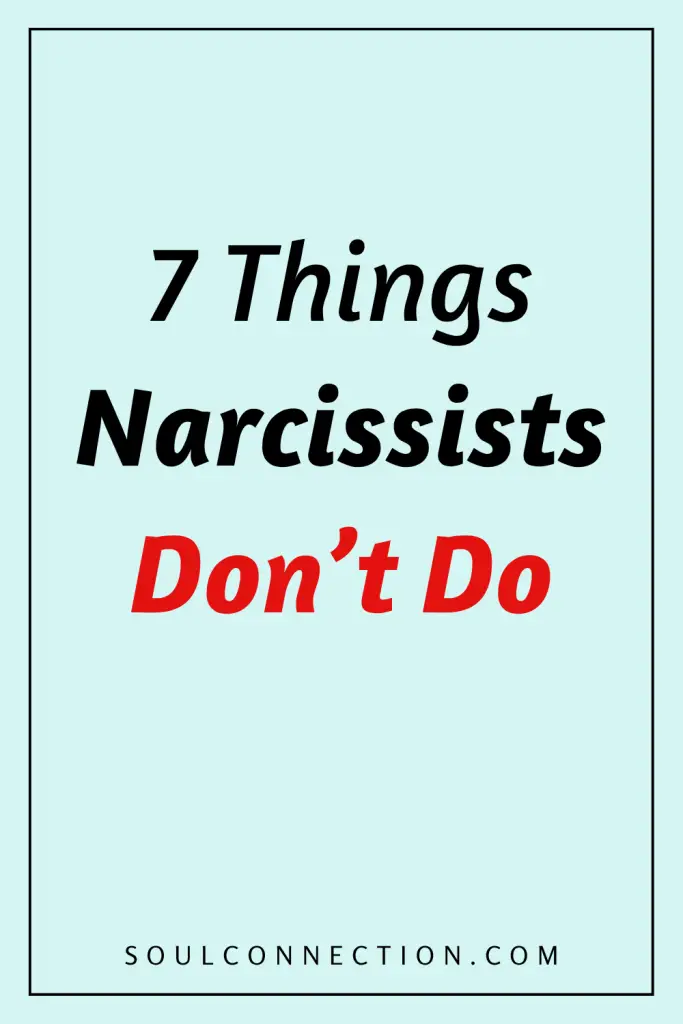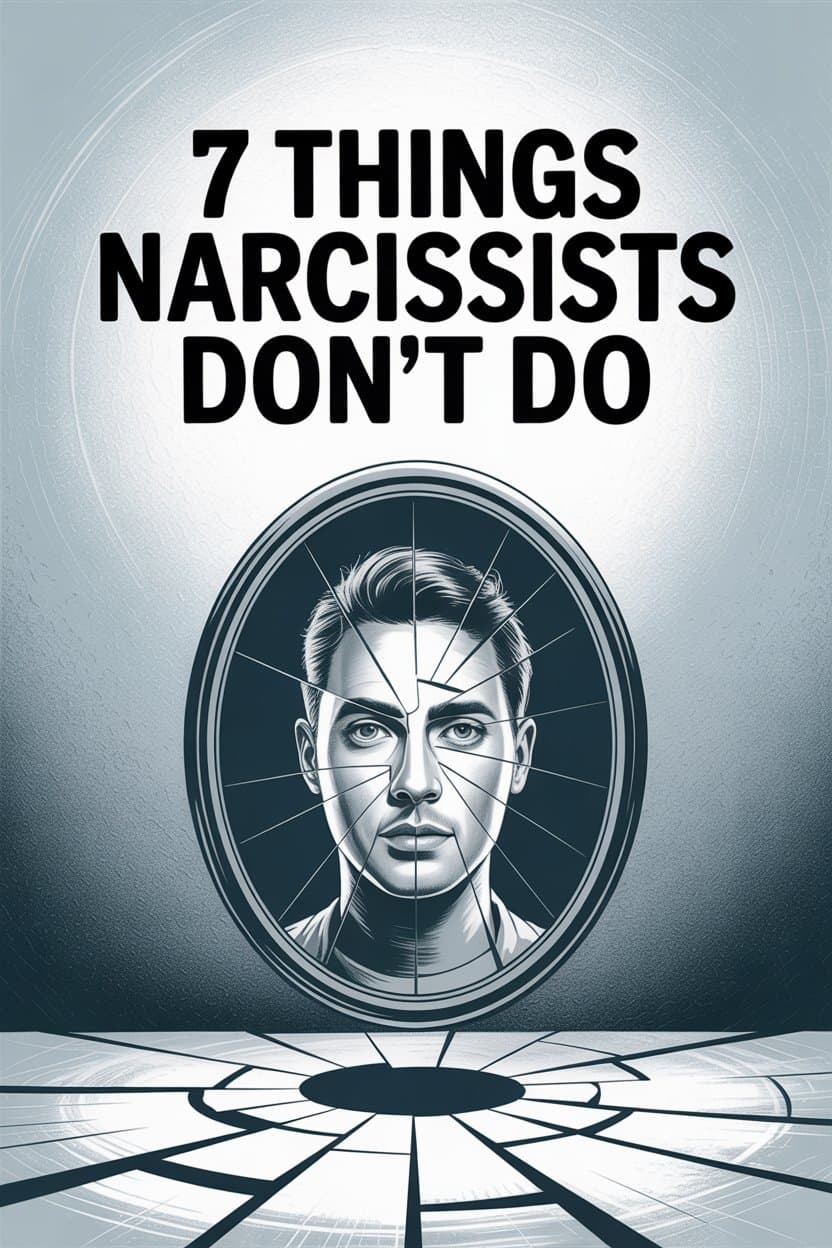Ever wondered what it’s like inside the mind of a narcissist? Spoiler: It’s mostly mirrors and a running monologue about how amazing they are.
While the rest of us are slogging through therapy and podcasts about “growth,” narcissists are skipping right past the hard stuff.
Here are seven things narcissists expertly avoid, and why it matters for anyone who’s ever dated, worked with, or been raised by one.
1. Admit Fault
Waiting for a narcissist to genuinely say, “My bad,” is a bit like waiting for a unicorn to hand-deliver your Amazon parcel. Sure, they might say the words, but only with a side of “but you made me do it,” or “if you hadn’t been so sensitive.”
Accountability feels like an allergic reaction to them.
This isn’t just about pride. For many narcissists, being wrong cracks the carefully constructed image they maintain. Admitting fault shakes the foundation of their self-worth, which is often as fragile as a house made of soggy crackers.
If you’re in a relationship with someone who never says sorry—unless it somehow puts the blame back on you—make a note.
2. Offer Genuine Empathy
Plenty of people struggle to relate sometimes, but narcissists treat empathy like a riddle wrapped in an enigma, hidden behind a velvet rope.
They might mimic empathy’s greatest hits (“that must be hard for you”), but there’s an uncanny hollowness behind the words.
Real empathy means feeling with someone, not just reciting phrases from a self-help book. With narcissists, compassion is transactional.
The moment your feelings threaten to steal the spotlight, they’re suddenly busy, bored, or weirdly competitive about whose problems are worse. Emotional support? Only if you’re prepared to pay them back in ego-strokes.
3. Celebrate Other People’s Successes
If you land a promotion or finally run that 5K without fainting, a healthy partner is thrilled for you. Narcissists, though, see your achievements as a direct threat.
Their go-to move: downplay, dismiss, or somehow make it about them. (“Wow, that’s great! Remember when I won Employee of the Month in 2006?”)
This isn’t just garden-variety jealousy. Narcissists view every win as a pie with limited slices; if you get a bigger piece, theirs must be smaller.
If you’re noticing a pattern of your joys being met with crickets—or thinly veiled one-upmanship—it’s not just your imagination.
4. Offer Unconditional Support
Narcissists love a good fair-weather friendship. When you’re up, they’re there for the ride, basking in your reflected glory like a selfie with excellent lighting.
But when the chips are down? Suddenly, they’re too busy, too tired, or deeply invested in someone else’s drama.
Long-term support isn’t their thing. Emotional labor, patience, and reliability require a level of selflessness that rarely fits in their toolkit.
If you’re constantly walking on eggshells, worried that your struggles will “bore” or “burden” them, you’re probably not imagining it.
5. Accept Constructive Criticism
Giving a narcissist feedback is like trying to explain the offside rule to a cat: met with confusion, annoyance, and possibly scratching.
Even the gentlest, kindest suggestion is perceived as a personal attack. Expect deflection, projection, or the classic “But what about you?”
This hyper-defensiveness isn’t just a quirk; it’s a feature. A narcissist’s fragile self-image can’t tolerate the idea of imperfection. Critique is spun into a full-blown character assassination in seconds flat.
If every disagreement escalates into a melodrama, you’re not alone.
6. Apologize Sincerely
A true apology takes guts. Narcissists, on the other hand, treat apologies like a foreign language—one they never quite mastered.
If you do wrangle an “I’m sorry,” check for fine print: it’s rarely free from caveats, excuses, or finger-pointing.
Sincere apologies require a recognition that someone else’s feelings matter as much as their own. That’s a tall order for a personality geared toward self-preservation at all costs.
If every “Sorry” feels like a set-up for what you did wrong, pay attention.
7. Prioritize Others’ Needs
Compromise makes healthy relationships work. Narcissists treat compromise like a last resort, somewhere between eating kale and going to the dentist.
Their needs come first, second, and third—yours slot in somewhere after the neighbor’s cat.
Plans rarely change to accommodate you, and your feelings about family holidays, Netflix shows, or dinner spots tend to get steamrolled.
In their world, flexibility is for yoga instructors, not relationships. If you’re consistently sidelined, there’s a reason.
Breaking the Cycle
Spotting these patterns isn’t about handing out personality diagnoses at brunch. Everyone has narcissistic moments (Instagram, anyone?).
The difference is whether someone is willing to do the work—acknowledge their impact, listen, and grow. Narcissists, as a rule, dodge this uncomfortable territory.
If this list feels uncomfortably familiar, know that you’re not losing your mind, and you’re not asking for too much. Healthy relationships are built on give and take, empathy, and a willingness to be wrong once in a blue moon.
If you’re not getting that, it’s okay to ask why—and what you want to do about it.


